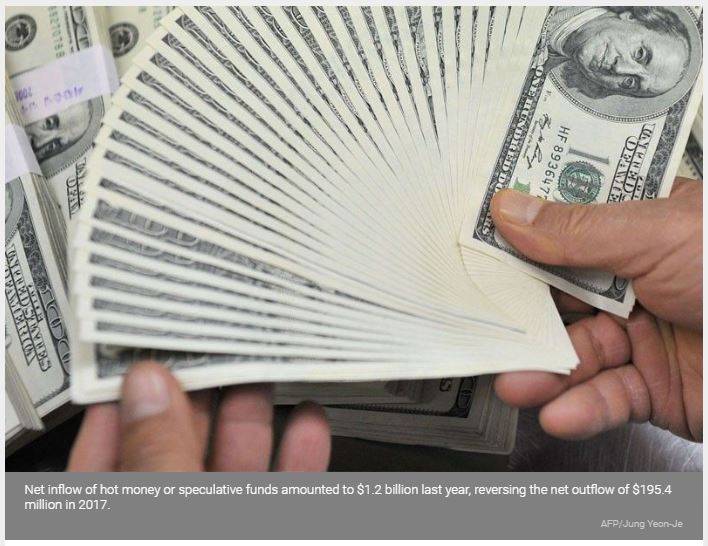Philippines: Hot money swings to $1.2 billion net inflow in 2018
MANILA, Philippines — More foreign portfolio investments flowed into the Philippines last year, hitting the highest level in five years and reversing the net outflow in 2017 as investors welcomed the implementation of the government’s tax reform program, according to the Bangko Sentral ng Pilipinas (BSP).
Net inflow of hot money or speculative funds amounted to $1.2 billion last year, reversing the net outflow of $195.4 million in 2017.
This was the highest since 2013 when net inflows of foreign portfolio investments reached $4.22 billion. Foreign portfolio investments are also called hot or speculative money because of its flighty nature.
The BSP was expecting a smaller net outflow of foreign portfolio investments amounting to $100 million last year from a net outflow of $205.05 million in 2017.
Latest data showed registered foreign portfolio investments amounted to $16.03 billion in 2018, 0.2 percent lower than the $16.07 billion recorded in 2017.
On a monthly basis, the BSP said the highest gross inflow was recorded in March at $2.5 billion, while the lowest was noted in September at $743 million.
On a quarterly basis, the largest inflow was noted in the first quarter at $5.1 billion, representing 32 percent of the total inflows for 2018.
“This may be attributed to the large investment in a holding company registered this year accompanied by investors’ optimism over the passage of the first phase of the government’s tax reform program,” the central bank said.
Major sources of foreign portfolio investments include blue chip companies that issued debt papers including conglomerate San Miguel Corp. through San Miguel Food and Beverage with roughly $650 million, Petron Corp. with $500 million, and International Container Terminal Services Inc. with $400 million.
Likewise, the maiden panda bond sale of the Philippine government also raised $230 million.
Portfolio investments were mainly in securities listed at the Philippine Stock Exchange (PSE) that accounted for 71.4 percent followed by peso government securities with 20.2 percent and other peso debt instruments with 8.3 percent.
The BSP said other peso debt instruments yielded a net inflow of $1.3 billion followed by peso government securities with $1.2 billion as well as peso time deposits with $1 million.
The net inflows were enough to wipe out the outflows in PSE-listed securities amounting to $1.3 billion as the PSE index shed 12.76 percent to end at 7,466.02 in 2018.
The United Kingdom, US, Singapore, Netherlands, and Hong Kong accounted for 72.8 percent of the total inflows in 2018.
On the other hand, outflows declined by 8.8 percent to $14.83 billion last year from a year-ago level of $16.27 billion. About 96.8 percent of total outflows represented capital repatriation with the remaining 3.2 percent pertaining to earnings.
The BSP said the US continued to be the main destination of outflows, receiving 78.8 percent of total.
For this year, the BSP sees a net outflow of $200 million for foreign portfolio investments.
Source: https://www.philstar.com/business/2019/01/18/1885945/hot-money-swings-12-billion-net-inflow-2018#jdD2d7v83rhBiFuL.99


 Thailand
Thailand




